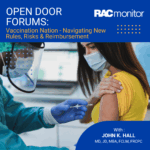Providers are beginning to embrace the concept of holism, as it pertains to healthcare management.
When we hear the word “silo,” we tend to think of certain structures on farms. Basically, the function of silos is fulfilling the need to preserve grain for later use. In the simplest sense, they are designed to keep the grains safe from rodents, insects, moisture, fire, or natural or manmade calamities such as floods, earthquakes, or wars.
While agricultural silos refer to the separation and storage of assets vital to a farm, organizational silos refer to the separation of a different kind of asset, vital to an organization: people. Organizational silos, in business terms, are defined as the separation of different types of employees, often defined by the department in which they work.
The silo concept is not new, as it has been ingrained (no pun intended) in our society. For example, grammar school: initially, it is the same teacher for all subjects, one classroom, homework assignments from that one teacher, and so forth. In later grades, there’s a different classroom, and teacher and homework assignments for each subject, with minimal to no communication between them: true silos.
We have these silos in healthcare, specifically in the clinical revenue cycle (CRC). Fortunately, we have a common factor for our siloed existence that isn’t necessarily found in other environments – and that is documentation. Each module of the CRC is focused on the same documentation, but through their own lens – and there is seldom any knowledge-sharing, partly because of disparate systems.
Ideally, for better functionality, these silos need to be broken down, but also need to be rebuilt, utilizing a holistic point of view. Holism! What is it? In essence, holism is a theory holding that no one part is more important than any other – or more important than the sum of all parts, the whole. The human body is the most elegant example of holism. The human body is composed of many different silos or systems, but no one system is the most important. One may say that the heart or the brain is the most important, but neither can function on its own (or not be present at all).
In clinical revenue cycle, to repeat, these silos must be broken down, but they can’t be left that way. They must be rebuilt for:
- Cross-functionality;
- Knowledge-sharing;
- Interoperability;
- Standardization; and
- Accountability.
Can you imagine if the brain did not share with the heart that it’s really hot outside, and that the heart rate needs to increase and the blood vessels dilate to initiate sweating, in order to prevent overheating? Consider that knowledge-sharing, just one aspect of the holistic approach. Just imagine the improvement and efficiency that could be achieved if we instituted a holistic approach to our silos.
We already have the key element – documentation.
Program Note: Listen to Dr. Zelem as he reports this story live today during Talk Ten Tuesdays at 10 a.m. EST.

























